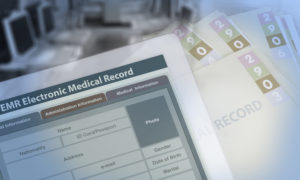
Photo credit: Getty Images
Refining and improving how you code for cataract co-management.
By Mark K. Davis, OD
April 17, 2024
Cataract co-management with ophthalmology has been part of optometry’s role in patient care for several decades.
Ever since Medicare recognized us as physicians, we have been able to directly bill Centers for Medicare & Medicaid Services (CMS) for post-op cataract co-management.
Each surgical CPT procedure generally has a pre-surgical, intra-surgical and post-surgical portion that is assigned to the single global reimbursement.
Other Articles to Explore
The post-surgical portion is typically 20 percent of the total reimbursement. For this article, we are interested in the post-surgical portion. There are certain rules and restrictions that apply. Let’s look at them.
CMS Standards for Cataract Surgery Co-Management (55 modifier)
- The service for which the initial referral is made must not be within the medical expertise of the referring party and must be within the special expertise of the party receiving the referral, i.e. optometry does not perform cataract surgery.
- The parties should receive no payment from each other for the referral. This would be known as a “kick-back.” (see below for more information)
- The only exchange of value permitted between the parties would be the monetary remuneration each party would receive directly from third-party payers or the patient as compensation for professional services furnished by each party to the patient.
- Co-management decisions should be based on the patient’s best interest and not coercion or inducement. The transfer of care is not used as an incentive for obtaining referrals from providers to receive post-operative care reimbursement.
- Co-management decisions should be considered on an individual basis and not a blanket policy. This is where optometry got in trouble!
- Proper and complete documentation between providers is a must. The patient must consent to the transfer of care. The transfer of the patient must be in writing.
Co-Management Process
- Must coordinate the time the OD takes over care from the surgeon, with no overlap. This is extremely important! A mistake on the dates, and the claim will be denied. It is up to the optometrist to decide what his/her comfort level is for taking over care of the patient. Is it day one, one week after, one month after, etc.?
- Cannot send the claim to Medicare until you actually have a “face-to-face” with the patient.
- Can bill for the entire time of co-management, even if the patient did not come in until the 90th day.
- Generally, it is best to hold the claim until the 90 days are complete. I have sent claims in before the co-management period was complete and had the claim rejected as being paid “ahead” of services being completed.
Click HERE for more information about Medicare coverage during the co-management process.
Coding for Post-Op Care
Typically, the surgeon will decide which cataract surgery procedure will be performed on the patient. The most common procedure is 66984, extracapsular cataract removal with insertion of intraocular prosthesis, manual or mechanical technique (CPT 2024). You will file using the same CPT code. The surgeon will file for the surgery only, using the 54 modifier and designating which eye.
66984-54-RT (box 24-D on CMS 1500 claim form)
The diagnosis code could be: H25.11 Age-related cataract, right eye or H25.12 Age-related nuclear cataract, left eye. The surgeon will provide you with the diagnosis code they used. Use the same code. (box 21-A on CMS 1500 claim form)
The optometrist will file the claim as follows on CMS 1500:
Same diagnosis as surgeon in box 21-A H25.11
Dates of service in box 24-A (very important) 01/02/2024 to 03/31/2024 (90 days)
CPT code and modifiers in box 24-D 66984-55-RT
Do All Third-Party Payers Recognize Co-Management?
No! In Texas only, Medicare and traditional Medicaid recognize co-management of cataract surgery. You should check with your state optometric association for guidance or the traditional Medicaid provider in your state.
If the third-party provider does not recognize co-management, then you would bill each encounter with the patient separately. You would use either an ophthalmological or E/M code, depending on the length of time spent with the patient. The most common codes used would be either 92012 or 99213.
Don’t Get Greedy!
Again, beware of violating the anti-kickback statute, which I cited in a previous ROB article. The Department of Justice (DOJ) report alludes to “other parties involved,” which may well be optometry. HERE are the details on the settlement of the case.
Until next time…Happy Coding!
 Mark K. Davis, OD, is a Therapeutic Optometrist and Optometric Glaucoma Specialist, Diplomate, American Board of Optometry, Adjunct Assistant Professor, University of Houston College of Optometry and Chief of Optometry, 147th Medical Group. He is Lt Col, Texas Air National Guard, Ellington Field JRB, Houston, Texas. To contact him: mkdavisod@gmail.com
Mark K. Davis, OD, is a Therapeutic Optometrist and Optometric Glaucoma Specialist, Diplomate, American Board of Optometry, Adjunct Assistant Professor, University of Houston College of Optometry and Chief of Optometry, 147th Medical Group. He is Lt Col, Texas Air National Guard, Ellington Field JRB, Houston, Texas. To contact him: mkdavisod@gmail.com



























